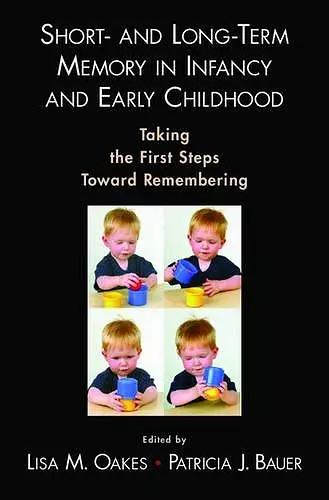Short- and Long-Term Memory in Infancy and Early Childhood
Patricia J Bauer author Lisa M Oakes author
Format:Hardback
Publisher:Oxford University Press Inc
Published:10th May '07
Currently unavailable, and unfortunately no date known when it will be back

The ability to remember people, objects, and events one encounters is critically important for effective functioning in the world. Remembering your mother's face, where you left your keys, and that it is your daughter's birthday tomorrow allow you to successfully manage your day, as well as your relationships with others. Questions about the processes of memory and how they develop are age old. In developmental science, research on memory has been prominent since the writings of Jean Piaget became available to English-speaking audiences in the 1950s and 1960s. This book focuses on recent empirical and theoretical advances in the study of memory development in infancy and early childhood. Both short-term and long-term memory are critically important for infants' learning about the world around them, as well as their development and maintenance of social relationships. Some of the most significant questions and concerns are addressed, with the aim of identifying areas of consensus and areas in which further theoretical and empirical work is necessary.
". . . a well-integrated vision of memory processes from infancy through the preschool period. In the best tradition of developmental science, the chapters connect this developmental work in a meaningful way with the literature on adult memory, and they provide a substantive treatment of individual differences." --John Colombo, Professor of Psychology and Associate Director of Cognitive Neuroscience, Schiefelbusch Institute for Life Span Studies, University of Kansas ". . . By providing a venue for the discussion of findings, methods, underlying assumptions, points of agreement and disagreement, and gaps in our understanding, Oakes and Bauer have produced a book that not only defines what we know about early memory and its development, but also articulates how we have come to know it and what we still need to know. This is an exceptional volume, one that should be required reading for anyone interested in memory and cognitive development." -- Peter A. Ornstein, F. Stuart Chapin Professor of Psychology, University of North Carolina at Chapel Hill "This is an impressive survey of progress in understanding memory development in the first few years of life. The strong focus throughout the book on change mechanisms, both neural and behavioral, is especially praiseworthy." --Robert Siegler, Teresa Heinz Professor of Cognitive Psychology, Carnegie Mellon University "This is an outstanding collection that goes beyond the usual limitations of edited volumes." --Philip David Zelazo, Professor and Canada Research Chair in Developmental Neuroscience, Department of Psychology, University of Toronto ". . . a well-integrated vision of memory processes from infancy through the preschool period. In the best tradition of developmental science, the chapters connect this developmental work in a meaningful way with the literature on adult memory, and they provide a substantive treatment of individual differences." --John Colombo, Professor of Psychology and Associate Director of Cognitive Neuroscience, Schiefelbusch Institute for Life Span Studies, University of Kansas ". . . By providing a venue for the discussion of findings, methods, underlying assumptions, points of agreement and disagreement, and gaps in our understanding, Oakes and Bauer have produced a book that not only defines what we know about early memory and its development, but also articulates how we have come to know it and what we still need to know. This is an exceptional volume, one that should be required reading for anyone interested in memory and cognitive development." -- Peter A. Ornstein, F. Stuart Chapin Professor of Psychology, University of North Carolina at Chapel Hill "This is an impressive survey of progress in understanding memory development in the first few years of life. The strong focus throughout the book on change mechanisms, both neural and behavioral, is especially praiseworthy." --Robert Siegler, Teresa Heinz Professor of Cognitive Psychology, Carnegie Mellon University "This is an outstanding collection that goes beyond the usual limitations of edited volumes." --Philip David Zelazo, Professor and Canada Research Chair in Developmental Neuroscience, Department of Psychology, University of Toronto
ISBN: 9780195182293
Dimensions: 157mm x 236mm x 25mm
Weight: 635g
362 pages